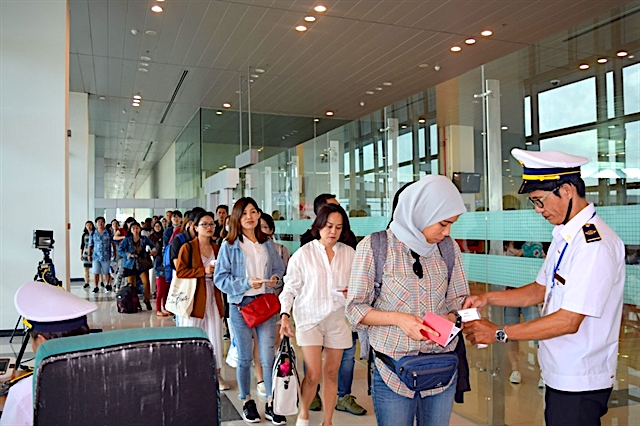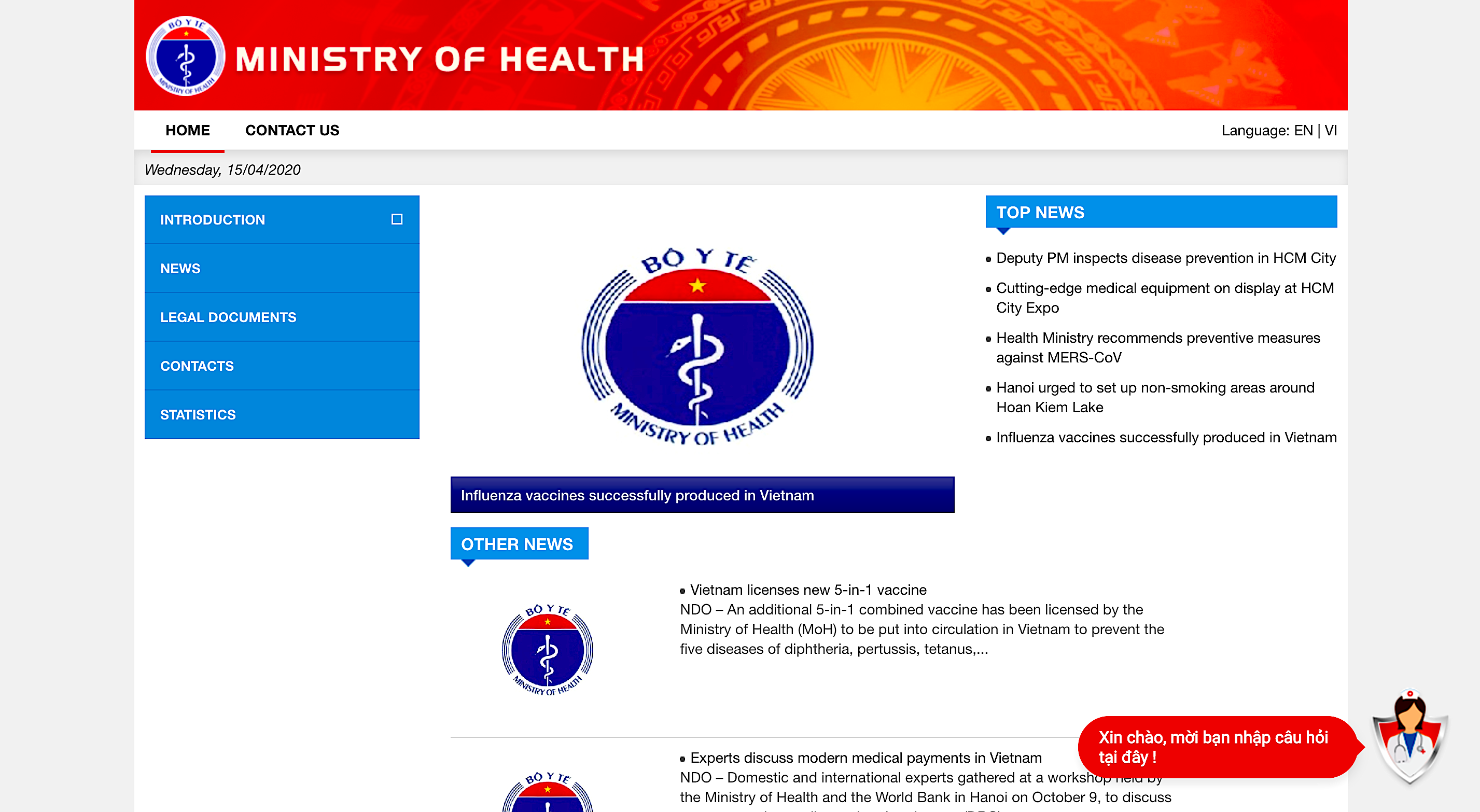The World Economic Forum, the Financial Times and others laud Vietnam as a low cost Covid-19 success story to be emulated by poor countries with limited resources, say Anis Chowdhury and Jomo Kwame Sundaram.

Medical staff member monitors the body temperatures of train passengers at the Saigon Railway Station in District 3, Ho Chi Minh City. (Photo: Duc Phu)
By Anis Chowdhury in Sydney and
Jomo Kwame Sundaram in Kuala Lumpur
Inter Press Service

 Vietnam, just south of coastal China, is the 15th most populous country in the world with 97 million people. According to its Ministry of Health (MoH), as of April 13, there were 262 confirmed cases of COVID-19, with 144 recovering or discharged from hospitals, and no deaths.
Vietnam, just south of coastal China, is the 15th most populous country in the world with 97 million people. According to its Ministry of Health (MoH), as of April 13, there were 262 confirmed cases of COVID-19, with 144 recovering or discharged from hospitals, and no deaths.
With officials acting quickly to trace and test contacts, as well as quarantine and treat the infected, Vietnam contained the first wave of infections in January. Following a second wave of 41 new cases, Vietnam imposed a national isolation order on March 31. The country has already conducted more than 121,000 tests, with more than 75,000 people in quarantine or isolation.
After more than a dozen people, linked to Bach Mai Hospital in Hanoi, tested positive, authorities have been tracing contacts, advised more than 10,000 people who were at the hospital since March 12 to get tested, and locked down a nearby rural hamlet for 14 days.
The Australian Strategic Policy Institute noted “Vietnam’s experience demonstrates how, by focusing on early risk assessment, effective communication and government-citizen cooperation, an under-resourced country with a precarious healthcare system can manage the pandemic. In facing an indefinite unknown, decisive leadership, accurate information and community solidarity empower people to protect themselves—and each other.”
The influential World Economic Forum, the Financial Times and others laud Vietnam as a low cost Covid-19 success story to be emulated by poor countries with limited resources.
Containing Infection, Vietnam-style
While much more resource constrained, some key features of Vietnam’s response are similar to other much lauded East Asian responses, with its infection rates significantly lower than even Taiwan’s. For many other developing countries struggling to cope with the Covid-19 pandemic, key aspects of its response are very relevant.
Early Action
Having experienced the SARS1, avian flu and other recent epidemics, Vietnam acted early and pro-actively in response to the Covid-19 threat. When only 27 Covid-19 cases had been detected in Wuhan City in mid-December 2019, Vietnam’s MoH issued prevention guidelines, including close monitoring of border areas and other steps to prevent infection of its population.
When China officially confirmed the first death due to the novel coronavirus on Jan. 11, Vietnam quickly tightened health checks at all borders and airports. Visitors’ body temperatures are checked on arrival; anyone with symptoms, such as cough, fever, chest pain or breathing difficulties, is quickly isolated for testing, and strictly monitored at medical facilities, while recent contacts are traced for follow up action.

Health officers check body temperatures of visitors at Can Tho International Airport. — (Photo CDC Can Tho cdccantho.vn)
Selective Quarantine
Other tough measures followed, including closing schools, rationing surgical masks, cancelling some flights, and restricting entry to most foreigners. They have been imposed unevenly, as needed, rather than as blanket, across-the-board measures. The government has asked all citizens to make online health declarations, and regularly texts updates nationwide.
Vietnam was the first country after China to seal off a large residential area. After cases were traced to workers returning from Wuhan, it imposed a 21-day quarantine on February 13 in part of Vinh Phuc province, north of Hanoi, where more than 10,000 people live.
The government also ordered that all arrivals in the country be quarantined, while those who arrived after March 8 are required to undergo medical evaluation. Two communes were put under lockdown on March 9 after a British tourist with the virus visited them.
Affordable Effective Testing
Vietnam developed a fast, efficient and affordable test kit within a month. Many countries have already shown interest in the kit, which uses a WHO-approved technique. Rapid development of the kit followed extensive urgent consultations with a wide range of scientists coordinated by the Ministry of Science and Technology.
Rather than mass testing, key to wealthier South Korea’s response, Vietnam has focused on isolating the infected, and tracking down their ‘primary’ (direct) and ‘secondary’ (next-level indirect) contacts in order to trace and test those more likely to be infected.
Concerned about stigmatization, Vietnam refers to infected persons by their case numbers. Exceptionally, the communist party government published the identity and itinerary of a prominent figure who had tested positive. When local businesses were reportedly ostracizing foreigners, the prime minister spoke out against such discrimination.
Social Mobilization
Medical students as well as retired doctors and nurses have been mobilized. According to Tran DacPhu, a senior adviser to Vietnam’s Emergency Operation Centre, “We have to mobilize all of society to the best of our capability to fight the outbreak together, and it’s important to find the cases early and isolate them”.
A fund-raising campaign to buy medical and protective equipment for doctors, nurses, police and soldiers in close contact with patients, and for those quarantined, was launched on March 19. By April 5, more than 2.1 million appeals had been texted, with a considerable summarized for the relatively poor society.
Transparency
The MoH’s online portal immediately publicizes each new case to all major news outlets and the general public, with details including location, mode of infection and action taken. Information is broadcast by television and via social media, including texts to all handphones.
Different ministries have jointly developed an ‘app’, reputedly very easy to use, allowing users to: submit health and travel information to get tested; know ‘hotspots’ where new cases have recently been detected; and get up-to-date information regarding ‘best practices’ in Vietnam and the world.
Vietnam’s response has earned a high level of trust among its citizens. About 62 percent of Vietnamese surveyed, in the single largest global public opinion study on Covid-19, think the Government is doing ‘right’, compared to the global average of around 40 percent.
Solidarity
While some rich countries act selfishly, Vietnam is following in the steps of Cuba and China in demonstrating humanitarian solidarity in the face of the Covid-19 threat to humanity.
It has shipped 450,000 protective suits to the US for healthcare professionals, and donated 550,000 masks to five European countries. Vietnam has also donated protective clothing, medical masks, testing equipment and kits – worth over US$300,000 – to Cambodia and Laos, and testing kits to Indonesia.
Emphasizing the importance of social solidarity, Prime Minister Nguyen Xuan Phuc has described Vietnam’s efforts to contain the virus as the “spring general offensive of 2020”, referring to the crucial 1968 Tet Offensive by ‘Viet Cong’ guerrillas during its last war.
Anis Chowdhury is adjunct professor at Western Sydney University and the University of New South Wales (Australia). He has held senior United Nations positions in New York and Bangkok.
Jomo Kwame Sundaram, a former economics professor, was United Nations assistant secretary-general for economic development, and received the Wassily Leontief Prize for Advancing the Frontiers of Economic Thought in 2007.
The views expressed are solely those of the author and may or may not reflect those of Consortium News.
Please Donate to Consortium News.


A stitch in time saves nine!
Cuba has also assisted Vietnam’s public health system with training in epidemiology and
preventive medicine and many Vietnamese doctors are graduates for Cuba’s 25 medical
schools with no tuition fees.
Tom Fawthrop
Journalist
Well done Vietnam indeed. They were the back-stop to Western hypocritical imperialism as it made it’s way west around the Earth from Mesopotamia thousands of years ago.
No to detract from this but I would wish people there would give up their superstitious beliefs about the healing qualities of now endangered species’ by- products. You know what I mean.
It is wonderful to see the success of Vietnam after it throwing off the corrupt former democracy of the US.
The US was the first western nation to rebel against colonialism, and the last to defend it (in Vietnam).
The first nation to blame this epidemic on others, and the last to defend itself against it (somewhat).
The first western nation to establish a democracy, and the last to realize that it no longer has one.
I advised visiting Chinese engineers in 1983 that they should combine a market economy with socialist institutions, and China did so within a few years. If only the US had the intelligence to do that: it knew in the 18th century that it must temper a strong central government with a Bill of Rights to protect the rights every citizen deserved. But as gold took over its institutions, it never again could see that it needed to regulate the market economy and provide social democratic institutions to protect its citizens.
Let’s get the gold out of mass media and government, purge and restructure them with lifelong monitoring of officials, downsize the MIC 80% and put the difference into foreign aid to the neediest nations. Only then can America be great again.
Vietnam’s resilience shone through when the Imperialist West brutalised their country. The Americans never forgave Vietnam for turfing them out of their country with their tails between their legs. Now Vietnam is demonstrating to the World how humanity should deal with each other in a crisis. This could be a new beginning if Western Powers curb their arrogance and greed and join the Human community once again. Difficult to envisage but I hope so.
Imagine if the mighty Americans had won the “Vietnam War”. Vietnam must be so proud about themselves now.
..When you guys dropped tons of bombs on poor VN, they still survived and overcame. Now, you guys are in troubles VN did not hesitate to give a hand of help and not just you but with all neighbours who are in need of help..while they are still a poor country. See the difference??? If in doubt, just visit Vn or ask your expat communities..
Well said buddy
Every American who reads this piece should feel a sense of shame that the richest country on the planet can’t do a fraction of what little Vietnam has done for its neighbors.
Anger is a more appropriate response. Shame is for those who have done something wrong. Shame assumes we live in a real democracy and have some real control over the corrupt monstrosity that masquerades as our “democratic” system.
What we have is a two headed monster. One party that overtly panders to wealth and another wholly corrupt that claims to be for the common people. As Garland Nixon describes the system, “One party hates you the other doesn’t like you”. Either way they both think they are above everyone and really cater to themselves and their sponsors. This is why about half of Americans don’t vote.
By the way Vietnam’s public health sector has received excellent training in epidemiology from DTRA a defense department program that has been doing this sort of thing in post Soviet and other countries. Its the only thing the Pentagon does that is useful. Which shows the US has the knowledge and capability; it is just not applied adequately at home.
I’m sure some in the US would screech “fake news! They’re dying by the millions!” :-(